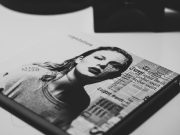LJ Woolston, a 38-year-old Miami-born trans, queer and non-binary social worker has a uterus. As someone who identifies as transmasculine, he can still get pregnant. So reproductive rights aren’t just a woman’s issue, he says. They also affect the transgender community.
“Abortion and choice are not just a woman’s issue,” commented Woolston, a guest speaker at the Bans Off Our Bodies Rally in Ives Estate Park this past weekend. “There are men, intersex, non-binary, genderqueer and two-spirit people who have babies,” he said. “This is an intersectional issue and unfortunately, I’m only seeing the word ‘women’ everywhere and as someone who still has a uterus, it makes me feel invisible.”
Under the hot Florida sun at Ives Estate Park in North Miami this past Saturday, nearly 2,000 people gathered – many holding signs protesting the U.S. Supreme Court’s recently leaked draft opinion to overturn Roe v. Wade, the landmark 1973 case that made abortion legal. Written by Justice Samuel Alito, the new decision could possibly end federal protections for safe abortions and reproductive rights.
The rally wasn’t designed to be a fundraiser, but people did drop off checks for Planned Parenthood. Money was also raised for three other organizations: Women’s Emergency Network, Dignity Power Now and Southern Birth Justice.
Planned Parenthood put together rallies nationwide, including the one in North Dade, this past weekend. There were 450 “Bans Off Our Bodies” protests across the country, with a total of 1 million protestors hitting the streets of major cities like New York, Washington, D.C., Los Angeles and Miami.
While much has been written about women who protested, far less has been publicized about the effect of overturning Roe on the LGBTQ+ community.
Recently, there has been an increase in violence against members of the LGBTQ+ community.
One member of that community who attended the pro-abort rally at Ives Estates was 27-year-old Jack Lee Jordan– a trans, disabled, queer and non-binary Black Puerto Rican who recounted being “stealthed” during a hook-up.
Stealthing is when someone slips a condom off during sex without the consent or knowledge of the other person. “When it was over, I was in a state of shock,” said Jordan. “I put my clothes on and went home. I scrubbed myself inside and out and I freaked.”
Jordan gave a speech to the crowd about hormone therapy’s effects on the menstrual cycle, which continues even after one stops taking it regularly. After being stealthed, Jordan became concerned about pregnancy and anxiously awaited a period.
“I knew fundamentally what I should’ve been doing [after being stealthed],” Jordan said. “But I didn’t go to a clinic or seek out local resources because I believed there was no one who could help me. So I just sat there in my anxiety for weeks.”
Jordan said during the speech that this fear affects trans and non-binary people of color every day. “We are assaulted by our partners, lovers, friends and strangers at a disproportionately higher rate than cisgender people,” said Jordan. “We are also assaulted by transphobic, misogynistic and racial medical bias by government overreach that often keeps us waiting for the care that we need.”
Jordan added that it is wrong to see abortion only as a white woman’s issue.
“When it comes to trans folks, specifically assigned female at birth trans folks, we have higher rates of pregnancy because of the lack of medical research regarding how hormones and different factors affect our bodies,” Jordan said. “If we don’t talk about the nuance of gender, race, and other factors, we’re really missing a major part when we talk about abortion rights.”
Woolston agreed with Jordan in a five-minute speech. He said he wanted to educate people on the topics of gender identity, expression and sexual orientation.
He spoke with confidence and rhythm like he was doing a spoken word poem. His speech focused on the trials and tribulations of the transgender and gay community over the years.
He spoke of the AIDS quilt – a 54-ton tapestry that includes nearly 50,000 panels dedicated to queer and trans people that fought for their rights since the mid-1980s.
He emotionally recounted the medical aspect of his transition, the daily doses of testosterone, how little has been invested in trans medicine, and how the research on the issue is “as paper-thin as the lining of my thinning uterus.”
“As trans and non-binary people, this is just the beginning of the barriers we must often scale to live as our authentic selves,” he said. “This society would largely prefer to dictate where and how and whether or not we can choose to give birth, who we can love, who we can marry and who we can f*ck.”
Correction: An earlier version of this story incorrectly included the name of a fund to which activists were contributing, wrongly stated LJ Woolston’s age, and inaccurately identified how they identified themselves,
































